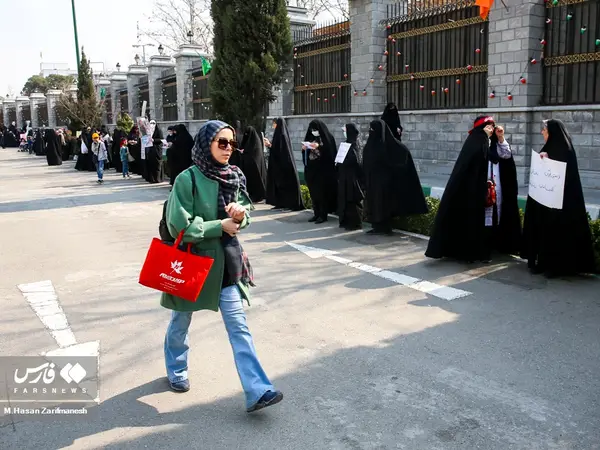Iran's hardliners appear to be launching a new effort to enforce veiling laws more forcefully again to put a stop to women’s increasing defiance of the compulsory hijab.
At a meeting of the State Social Council Thursday, President Ebrahim Raisi described women’s abidance by veiling laws as a “sharia requirement” and said all authorities are of the same mind on this matter. “It is necessary for everyone to feel responsible, and although some people may have different opinions on this matter, in social life, adherence to legal standards should be considered as a principle".
He also claimed that the social experience of the Islamic Revolution has shown that the Iranian women themselves are adamant on keeping the veiling as a priority to ensure their safety and security in the society while also calling on all responsible entities to support those who practice ‘amr-e be marouf’, that is, calling others to enjoin what is good and forbid them from doing what is wrong.
This video shows a veiled woman taking photos of two young girls on the street and telling them the photos will be used to identify them with face recognition software.
Raisi’s very influential father-in-law, Ahmad Alamolhoda, who represents Supreme Leader Ali Khamenei in Khorasan-e Razavi Province, urged “pious” women and men not to allow the women in the Iranian society unveil. Making similar remarks about individual’s responsibility to enforce the hijab last week he had implied that the regime and its security apparatus are no longer able to take the burden of stopping those who defy the compulsory hijab.
Several videos have emerged on social media in the past few days of disputes in public over veiling between its proponents and the women who are now defiantly appearing ‘hijabless’ in public.
“You live in an Islamic society and you must abide by its law,” a veiled woman holding a baby in her lap in a city bus is seen telling another woman in a video apparently taken in Isfahan, but the ‘hijabless’ young woman who is filming the incident with her mobile phone, objects and tells her how she dresses is none of other people’s business. The veiled woman threatens her with filming her, sending it to authorities and causing her trouble in getting into university for her defiance of the hijab.
A veiled woman being thrown out of an underground car by a crowd of young girls after trying to exhort them about observance of hijab.
To enforce the veiling rules the regime has always used the so-called ‘morality police’ as well as organized groups of male and female Basij militia. It was in custody of the morality police that the 22-year-old Mahsa Amini suffered injuries that led to her death in September, fueling the longest-ever anti-regime protests in the country.
The morality police have been keeping a very low profile in the past few months but on Wednesday hardliner female lawmaker Zohre Elahian said in a tweet that Basijis held their first “verbal warning (amr-e be marouf) maneuver” in some areas of the capital.
“The devout Basijis’ act, after the recent domestic and foreign riots and seditions in the country, is unprecedented,” she tweeted with a hashtag calling on authorities for support.
A video posted Wednesday on Twitter showed a long line of black-veiled women parading on a street in Isfahan in central Iran. The post called the parade “the great and mighty maneuver of chaste Isfahani ladies.”
These “maneuvers” seem to be part of a larger initiative planned to bring anti-compulsory hijab movement under control before more women flaunt the hijab rules in the intense heat of the summer.
